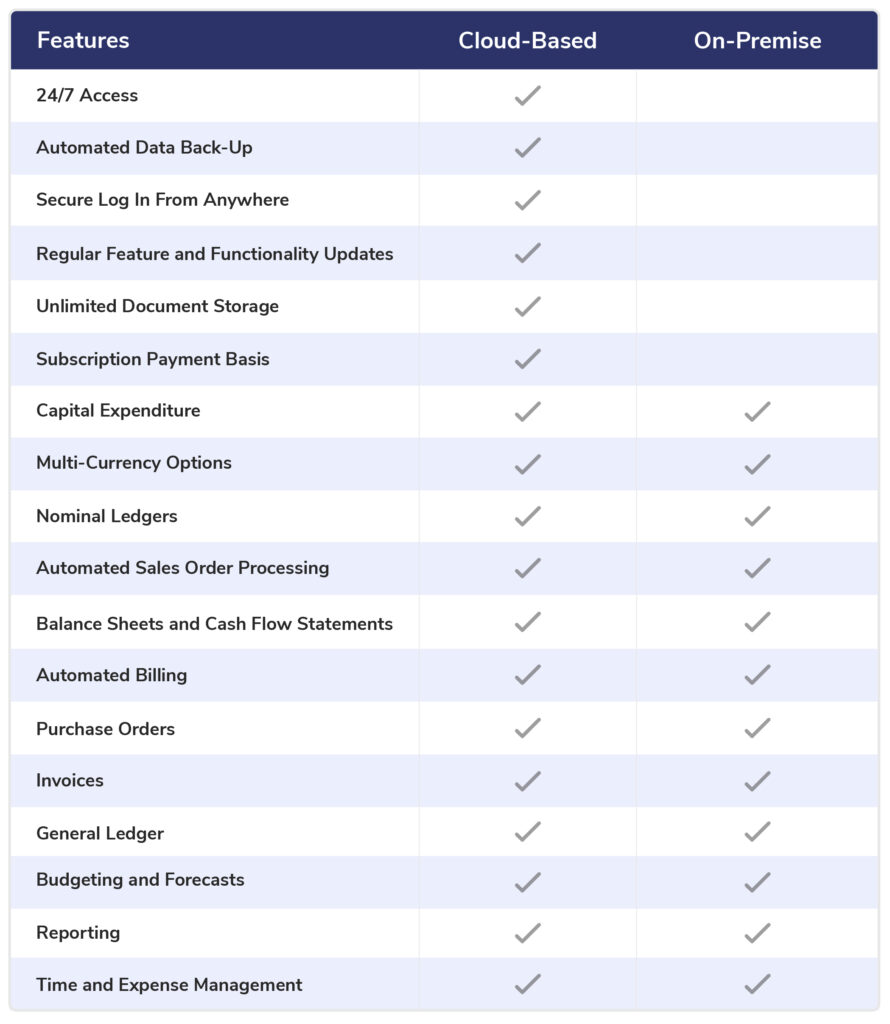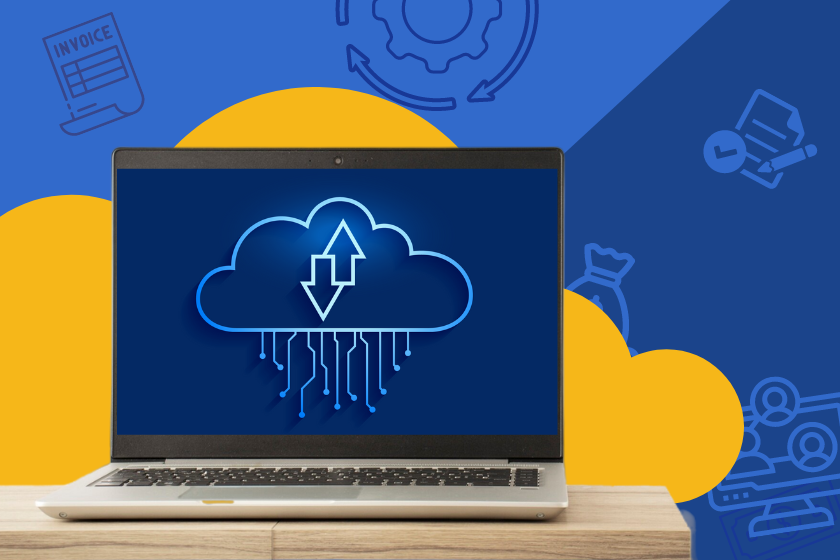The cloud-based vs on-premise accounting software is the common debate in the business world. Some prefer to use on-premise for universal access on the business location, but majority of businesses now uses cloud-based software fore remote accessibility.
Regarding how firms manage their accounting, there are several possibilities. Some companies simply outsource accounting to a third party, but this places essential company data and the capacity to properly exploit it for business insights in someone else’s hands. Those who implement accounting software can use either on-premise or cloud-based accounting software.
Cloud-Based vs On-Premise Software
A business need to ensure that they are choosing the best accounting software, whether it is cloud-based or on-premise software by determining its needs, budget, and other factors.
Know More: How To Choose The Right Accounting Software For Your Business
Cloud accounting businesses host their software and data with third-party providers, whereas on-premise software is placed on an organisation’s internal server. At one time, on-premise software was the only software delivery model available, which is why many firms that have acclimated to it are unwilling to move to cloud computing.
Cloud-Based
Companies that use cloud computing software contract a third-party provider to host their applications offshore, allowing them to offer IT resources on demand. These services are accessible on a pay-as-you-go basis, which saves companies money.
Businesses may adjust their use based on business growth, software requirements, and other factors.
Cloud computing lets businesses develop, interact with other businesses and customers, and expand globally.
On-Premise
On-premise software is installed on a company’s local server, allowing employees to access the database. Cloud computing software is stored on a distant server in the cloud.
In-house software provides a business with the peace of mind that its data is safe. In-house software is often more secure than cloud computing software.
Yet, on-premise software maintenance and management are more expensive than cloud computing. On-premise software costs include in-house server gear, IT personnel, software licencing, and other expenses.
Differences Between Cloud Accounting Software and On-Premise Accounting Software

What Are the 5 Benefits of Cloud Accounting Software vs. on-premise Accounting Software?
1. Scalability
In general, cloud accounting software can grow more easily with a company. Businesses may readily expand financial employees since all that is required to add more capacity is a user licence and a browser. It is simple to manage the accounting and finance function when a firm opens a new office, location, or subsidiary. Just login into a computer and using the programme is all that is required.
2. Accessibility
Cloud-based accounting software allows greater accessibility for employees. They can access the data whether on their laptops or mobile apps as the data are stored within the cloud storage. These can be accessed with a shared account that is granted to employees.
3. Cost Effectiveness
Hardware upgrades are a capital expense for on-premise accounting software. Contrarily, cloud accounting software may be implemented more affordably, subscription costs are simple to budget for, and your IT resource is freed up from labour-intensive software updates.
4. The Auditing Process
Cloud accounting software offers even another level of ease for financial audits. Several companies have simply been able to grant outside auditors access to their SaaS accounting system, allowing the auditors to work remotely rather than occupying a conference room with a small crew and a room full of boxes.
5. Automated Updates
Cloud accounting software continuously updates with new features and capabilities, ensuring that your company is always using the most recent version and receiving ongoing support. Compare this to the time needed to patch, manually update, and fix integration problems for on-premise accounting systems.
Which is the Best Choice for Your Business?
It is important to note that security is one of the main issues frequently stated as a reason not to switch to cloud accounting software, although this is a strong argument “for” the shift rather than “against”.
Significant and continual expenditures are needed to maintain security. In comparison to what is feasible or reasonable for the majority of individual organisations, the security measures used by a cloud accounting software supplier servicing many enterprises would be far more sophisticated and complicated. Since their livelihood depends on it, cloud service providers uphold the highest security requirements and industry certifications.
Cloud infrastructure is built with multi-layer security, 24-hour protection from physical and digital threats, and a focus on resilience. Data is likely to be far safer in a cloud data centre environment than in any dedicated on-site server room due to the rules, processes, and security measures in place to protect and secure your information in the cloud.
Furthermore, keep in mind that the majority of companies have either done so or are preparing to shift to the cloud. There are many reasons why, as we’ve seen in this essay, but for the majority, it’s probably just because it gives them the ability to accomplish so much more.
Ready to Swap to Cloud-Based Accounting Software?
If you want to adopt cloud-based accounting software for your business, you can contact us for a demo. Info-Tech’s cloud accounting software is equipped with every feature you need to automate your accounting processes, ease your operations, and reduce your costs significantly. Our experts will be more than willing to guide you through switching to our software.
Book A Demo With Us To See Our Accounting Software In Action
